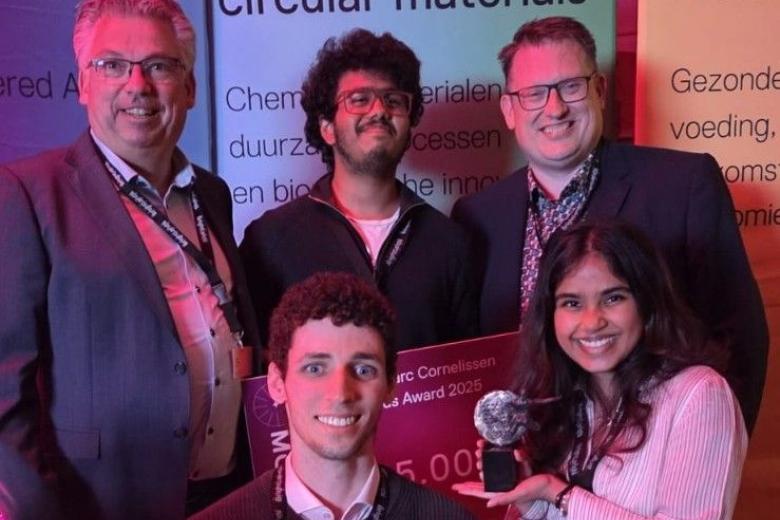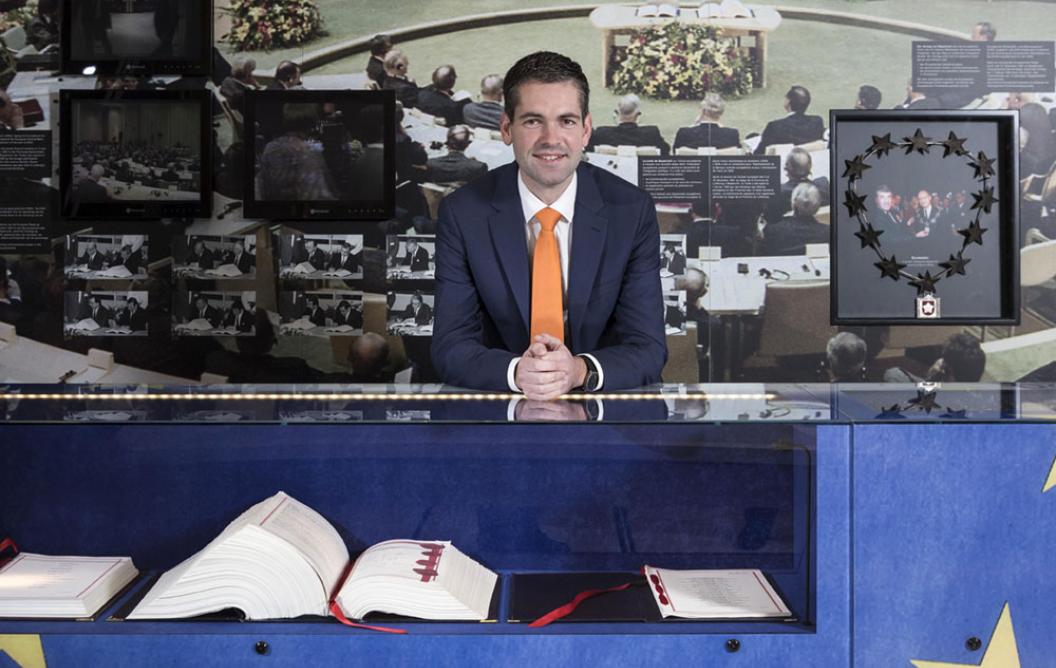“Europe belongs to all of us”
In 2018, European Studies alum Joost van den Akker became one of the regional ministers of Limburg, “the most international province of the Netherlands”. In his eyes, the university is a “European musketeer” whose pursuit of internationalisation and Europe is a winning model. “It’s an example to all of Limburg.”
Van den Akker considers his workplace perhaps the most beautiful provincial government building in the country. Perched on the banks of the river, it has an almost symbolic location: “The Meuse is a connecting element in the province.” White marble floors (“they’re not everywhere, just so you know”) lead to his office, down a long hallway lined with official portraits of governors of Limburg. “You don’t get used to it,” he says. “I feel privileged to work here on behalf of the people. I want to be focused and fully committed.”
The growing importance of internationalisation lured him to Maastricht in 2004. “The European Union was expanding and I wanted to know more about it.” He decided on European Studies for its international and English-taught curriculum, which allowed him to study a combination of subjects – history, law, economics, politics and public administration – all in fascinating border region. “The first year, I lived in Veldwezelt, Belgium. I cycled across the border every day, getting fresh bread from a vending machine along the way.”
Former prime ministers
The most memorable part of his studies was writing the bulky anniversary book Maastricht: The Treaty in 2006. “It allowed me to learn more about Maastricht and Europe, especially the summit held here in 1991. Who lobbied for it, who worked on it? I’ll always remember the interviews with former prime ministers and ministers like Ruud Lubbers, Wim Kok, Hans-Dietrich Genscher and Douglas Hurd.”
While still a student, Van den Akker became parliamentary group secretary of the local chapter of the VVD political party, moving on to the provincial parliament in 2011. “I wanted to translate the knowledge from my studies into liberal ideas about removing borders and Europe. There were Eurosceptics, within my own party as well. But I’ve always said – including to Mark Rutte, who back then was the parliamentary group leader – that we have to look for solutions to issues such as energy and migration in Europe. Europe is a political project.”
European musketeer
At the Provincial Executive, Van den Akker is responsible for the economy and knowledge infrastructure, including the development of the Brightlands campuses. “I see them as mini factories, experiments, but they’re also international communities that attract renowned researchers and students from abroad. My task is to make everyone feel welcome, including small and medium-sized companies, start-ups and grow-ups, and other Limburg citizens.”
He believes in combining the strengths of the government, the business sector and the university, which he compares to the Three Musketeers. “We have to do it together.” UM is a “European musketeer”, he says. “People sometimes wonder if things are becoming too international. But our university pioneered this. It consciously opted for internationalisation, sought out Europe and attracted students from abroad. It’s proved to be a winning model, an example to all of Limburg.”
Citizen participation
Internationalisation has also benefited the city of Maastricht. The city, province and university are collaborating on the joint programme Working on Europe: the city as a “living workshop for Europeans”, a meeting place for debate and dialogue, and a centre of expertise on Europe and European integration. In this context, Van den Akker wants to make it easier for local entrepreneurs use SME funding to establish subsidiaries abroad, among other things.
The EU has captured the attention of citizens, he notices, mainly due to Brexit. “It’s no longer a question of for or against. Europe exists, and people have to be able to move through it freely.” He sets great store by citizen participation. “Authorities should talk to people and not just go looking for their support after decisions have already been made. Europe, Brightlands, Maastricht Airport – it belongs to all of us.” In his PhD, Van den Akker demonstrated that governments have nothing to fear from referendums.
He does worry about “an undercurrent of disquiet in society”. “People today want it all and they want it now. The moment there’s friction, there’s resistance. They want clean energy, but they don’t want wind turbines in their backyard. They want online ordering with quick delivery, but no noise pollution from aircraft. You can’t have one without the other. I want to strike the right balance between these wishes and a healthy living environment.”
Bubble
Van den Akker hasn’t mapped out his career path. He’s not currently interested in Brussels. “Just this morning I went for a 45 minute run along the river. I have a wonderful job. My surroundings – nature, an economically flourishing region – are great. I don’t want to leave.”
He does have a few tips for European Studies students. Do an internship, but not necessarily in Brussels. “Many students are obsessed with Brussels; they think that’s where everything happens. But it’s a bubble that’s far removed from the rest of Europe. You can learn a lot about Europe at regional institutions like border information points.” Actively learn other languages, especially German and French. “It opens doors for you and makes contact with other people much easier.” And above all: “Do what feels good.”
Also read
-
Roy Broersma (CEI): Guiding Aestuarium from idea to venture
Roy Broersma, director of the Center for Entrepreneurship & Innovation (CEI) at SBE, has been closely involved in guiding Aestuarium from an early student startup to a growing venture. From spotting their potential during the Brightlands Startup Challenge supporting them through CEI.
-
From Study to Startup: The story behind Famories
When Lennie and Neele graduated, while many of their classmates were busy fine-tuning CVs and stepping into roles at top companies, they took a detour by recording podcasts with their grandmas. What began as a charming way to cherish family memories has blossomed into Famories, a vibrant startup with a...
-
Riding the waves of change: From a summer vacation to a life that feels as good as it looks
For SBE alumna Victoria Gonsior, one spontaneous decision: trying surfing sparked a journey of self-discovery, leading her to redefine success, embrace joy, and build a career that aligns deeply with her values. From quiet beaches in Sierra Leone to coaching sessions rooted in purpose, Victoria shares...
